
Research and consultancy firm Ecovia Intelligence predicts there will be a surge in consumer demand for upcycled food products in 2022 as awareness rises, products become more visible, and investment pours into the industry.
The term refers to foods that use ingredients that otherwise would not have gone to human consumption, are procured and produced using verifiable supply chains, and have a positive impact on the environment.
Ecovia said over 6bn pounds of produce is unharvested or unsold for aesthetic reasons every year in the US. About 28 per cent of agricultural land goes to food that is never eaten, while food waste and loss generate 4 per cent of greenhouse gases in the US alone.
It claimed new product launches and standards are helping to raise the visibility of upcycled foods. The Upcycled Food Association (UFA) launched the first certification scheme for upcycled ingredients and foods a year ago, and a raft of new certified products are due to come onto the market this year.
Natural food retailers are among the companies attracted to upcycled foods. In September, MOM’s Organic Market added a dedicated section for upcycled products including drinks, snacks and cosmetics in its 21 US stores.
Initially launched by small operators, upcycled foods are increasingly attracting investment from big companies. In the last 18 months, Dole, Mondelez Foods, Del Monte and Target have all invested in upcycled products.
Dole is investing in upcycling programmes in Asia. In Thailand, it is re-purposing 80 per cent of unwanted fruit to make snacks and packaging while in the Philippines, it has partnered with the start-up Ananas Anam to convert pineapple leaves into the vegan leather Piñatex.
In October, Dole teamed up with the Singaporean government to set up Dole Specialty Ingredients to create high-value products from waste streams. These initiatives are part of Dole’s goal to eliminate food waste and petroleum-based packaging by 2025.
In New Zealand, the start-up Lilo desserts is using unwanted fruits in its range of plant-based cheesecakes.
Californian company Barnana sources unwanted bananas and plantains from over 1,500 organic farmers in Ecuador to make snacks, while Arla Foods upcycles papaya waste from Ethiopian producers to produce nutrition bars.
Upcycled foods are capturing the attention of the financial community, with start-ups receiving investment. In June 2021, New York-based Rind Foods received US$6.1m to make dried fruit snacks from their peel. The company says it saves over 120,000 lbs of fruit peel that would otherwise go to landfill each year.
“As will be shown at the Sustainable Food Summit, there is high demand for upcycled foods,” Ecovia said.
“In summary, 2022 is expected to be the year that upcycled foods make their mark. Consumers are turning to upcycled foods as they become aware of the environmental and economic impacts of food waste and losses.
“Food producers are investing in upcycled foods as they help them achieve their sustainability goals. By creating high-value items using waste, upcycling also helps the food industry make the transition towards a circular economy.”
The Upcycled Food Association will be taking part in the 2022 Sustainable Foods Summit, which will be hosted online on 24-27 January.



